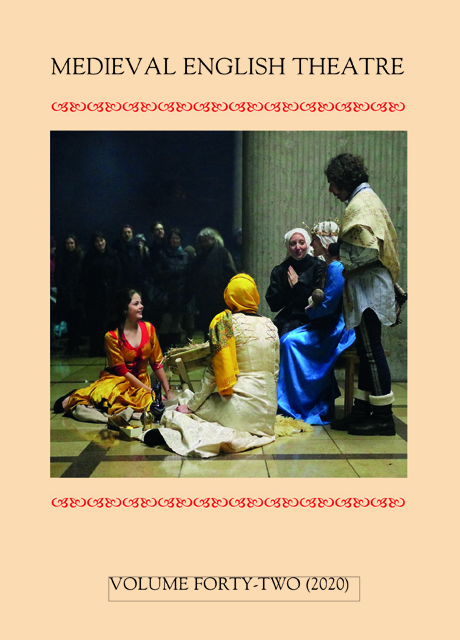Book contents
- Frontmatter
- Contents
- List of Illustrations
- List of Common Abbreviations
- Editorial
- Introduction: Reflections on the Medieval Convent Drama Project
- Fragments of Four Fourteenth-century Miracle Plays from Mont Saint-Michel
- Performing Female Authority: Convent Plays and Lay Spectatorship in the Barking Abbey Elevatio and Visitatio Sepulchri Dramatic Ceremonies
- Women in Religious Guilds: Performance and Community in Medieval and Tudor England
- When in Doubt: Thomas Indie and the Mid-sixteenth-century Reception of the Towneley Collection
- Taʿziyeh-khani in Iranian Communities: Muharram AH 1439 (AD 2017)
- Editorial Board
- Submission of Articles
Fragments of Four Fourteenth-century Miracle Plays from Mont Saint-Michel
Published online by Cambridge University Press: 17 January 2023
- Frontmatter
- Contents
- List of Illustrations
- List of Common Abbreviations
- Editorial
- Introduction: Reflections on the Medieval Convent Drama Project
- Fragments of Four Fourteenth-century Miracle Plays from Mont Saint-Michel
- Performing Female Authority: Convent Plays and Lay Spectatorship in the Barking Abbey Elevatio and Visitatio Sepulchri Dramatic Ceremonies
- Women in Religious Guilds: Performance and Community in Medieval and Tudor England
- When in Doubt: Thomas Indie and the Mid-sixteenth-century Reception of the Towneley Collection
- Taʿziyeh-khani in Iranian Communities: Muharram AH 1439 (AD 2017)
- Editorial Board
- Submission of Articles
Summary
In 1861, in St Lô in northern France, the conservateur of archives for the Département of la Manche came across a couple of parchment folios among a mass of monastic papers he was apparently intending to throw out. He put them to one side and some time later presented them to the historian Léopold Delisle, who recognized their importance. Each of the four surfaces bore rhyming verse in French in double columns that collectively appeared to comprise parts of four separate medieval tales, written as drama, from the island abbey of Mont Saint-Michel, although none of them was complete.
Delisle transcribed the text and encouraged his friend Eugène de Robillard de Beaurepaire to publish it in full with a short commentary. Beaurepaire (and it would appear that Delisle agreed with him) dated the manuscript to around the mid fifteenth century, but regarded the original text as fourteenth-century, presumably on linguistic grounds. Beaurepaire’s published text and a loose English translation of it by the present author may be found in the Appendix to this article.
Unfortunately the folios themselves now appear to be lost. They contained just 238 lines of text. Beaurepaire tells us that the third drama – which starts at line 118, roughly halfway through – began at the top of the recto of the second folio, so we may infer that the script covered both folios in their entirety. The first tale, Péril, recounted the best known of all the Mont’s miracle stories, so it was almost certainly the first in the sequence to be performed and the one with which the full manuscript will have commenced. On that basis, and bearing in mind also what we know of the full stories that these four fragments tell in part, what survives is probably folios 2 and 4 of a six-folio script. More speculatively, I suspect that the four stories were originally of approximately the following lengths: Péril, 165 lines; Populus, 100 lines; Jacquelin, 80 lines; and Aubert’s Bones, 320 lines. With the exception of Péril, these are not, sadly, their actual titles: I have simply chosen a character from each tale to identify them because the text contains no such headings.
- Type
- Chapter
- Information
- Medieval English Theatre 42Religious Drama and Community, pp. 10 - 49Publisher: Boydell & BrewerPrint publication year: 2021



